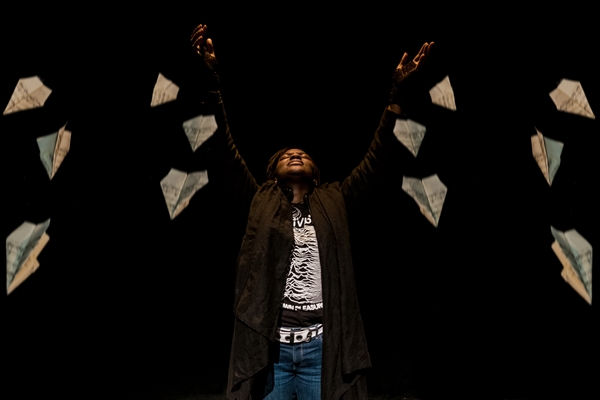Transit follows the story of Darya, over a decade, as she experiences the trauma of war, estrangement from her British father and the brutal loss of her Iranian mother. It’s a politically and culturally interesting backdrop, as she transitions from England in the late 70s, to a revolutionary Iran, on the precipice of war and huge change.
Sound effects, music and multimedia evoke atmosphere well, creating a bigger picture and farther reaching imagery than can necessarily be achieved by two actors alone on stage. The welcome party Darya and her mother receive on arrival in Iran feels particularly real. But the pièce de résistance comes in the recreation of an air strike, with the Traverse’s Studio 2 blacked out and sounds of explosions shaking the room, it is an immersive and haunting experience. Multimedia plays an integral role, a high screen relates subtitles of the dialogue and events as they unfold, requiring the actors to remain flawlessly word perfect and true to the script throughout, which they are. One of the benefits of the screen is that the audience can also read and better understand references which otherwise may be slightly lost and so it becomes somewhat of a culturally educational experience also.
The pace throughout is quite slow and runs the risk of losing our attention and interest. It is a thoughtful piece, but nevertheless needs more movement, using the slowing of pace for effect, rather than as the set rhythm. It isn’t only the pace that lacks light and shade, the performances seem to stay on the same few notes and Darya’s portrayal often feels like a theatrical presentation, rather than genuinely anguished and passionate. However, she does hold the character and steer the action well with strong stagecraft.
Although the issues explored in Transit are relevant and gripping and the content has a great deal of potential, in terms of theatre, it doesn’t feel particularly ground-breaking, experimental or exciting. Nevertheless, there are good moments and it is slick in its presentation.
